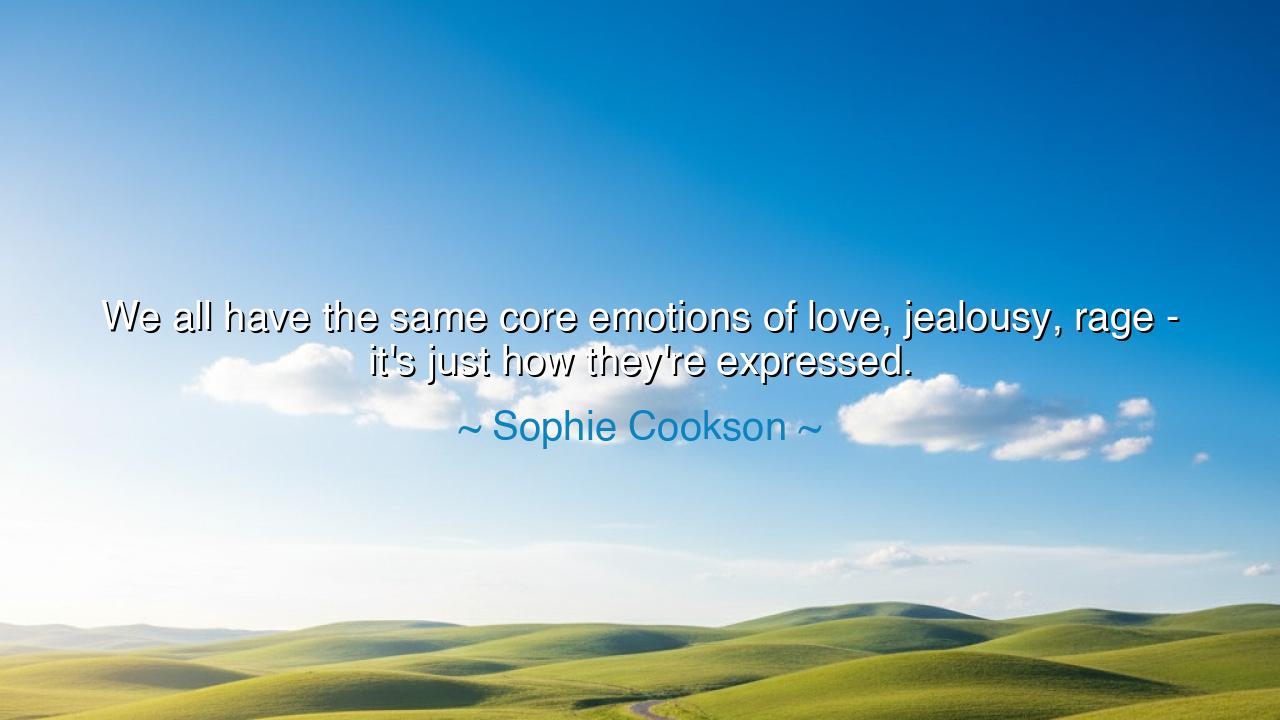
We all have the same core emotions of love, jealousy, rage - it's
We all have the same core emotions of love, jealousy, rage - it's just how they're expressed.






“We all have the same core emotions of love, jealousy, rage — it’s just how they’re expressed.” Thus spoke Sophie Cookson, reminding us of an ancient truth long known to sages and poets alike — that beneath the countless faces, nations, and names of humankind, there beats a single, shared heart. We are divided by language and culture, by belief and circumstance, yet the emotions that move us are the same fires that burned in the first people who gazed at the stars. Love, jealousy, rage — these are not strangers to any soul; they are the elements of our shared humanity, the storms and suns that shape our mortal lives.
From the earliest days, the ancients spoke of these passions as divine forces — blessings when mastered, curses when unleashed. The Greeks saw Eros as both a god of love and a bringer of madness. They saw Nemesis as the spirit of vengeance, and Phthonos as the god of envy. Even they, wise as they were, knew that what sets humanity apart is not the feeling itself, but how it is expressed. One man’s love builds temples; another’s consumes him with obsession. One woman’s anger sparks justice; another’s destroys all she cherishes. The emotions are the same — the difference lies in what the soul does with them.
Consider the tale of Alexander the Great, conqueror of nations. He loved his friend Hephaestion with a devotion fierce and pure, and when that friend died, rage and grief overtook him. In his sorrow, he ordered whole cities destroyed, monuments built, and men executed for imagined insults to the dead. The same heart that had loved so deeply now burned with wrath. Yet had his love been tempered with understanding, his rage might have become mercy, his mourning might have become wisdom. Thus, we see that it is not emotion that defines virtue or vice, but its expression.
Every human, whether king or beggar, sage or child, feels the pull of these core emotions. They are the currents that move us through life. Love calls us toward one another, building families and nations. Jealousy warns us of loss and teaches us humility. Rage, when guided by justice, defends the weak and rights the wronged. But when these same forces are left ungoverned, they turn to ruin — love to obsession, jealousy to cruelty, rage to destruction. The ancients taught that the wise man does not seek to silence his emotions, but to govern them as a charioteer guides his horses, with firmness and grace.
We see this truth reflected again and again through the ages. When Mahatma Gandhi felt the rage of injustice, he transformed it into peaceful resistance. His anger did not become violence; it became discipline. When Mother Teresa felt the love of humanity, she turned it into service, not sentiment. Her love did not consume her in longing; it made her hands heal the sick. These were not beings without emotion — they were masters of it. They proved that the noblest expression of feeling is not in its intensity, but in its purpose.
Sophie Cookson’s insight reminds us that there is no man or woman immune to these emotions. The tyrant and the saint both feel them; the difference is what they allow those feelings to become. Jealousy can drive one to betrayal or to self-reflection. Rage can destroy or can purify. Love can enslave or can liberate. The emotions themselves are neither angels nor demons — they are the raw clay from which each person shapes their soul. To deny them is to deny one’s humanity; to master them is to become truly human.
So, my children of the heart, let this be your lesson: do not fear your emotions, but do not serve them blindly. When love rises within you, let it lead to kindness, not possession. When jealousy stirs, let it become a mirror, showing you where you must grow. When rage burns, let it be a flame that purifies injustice, not one that scorches the innocent. In mastering the expression of your emotions, you master the art of living.
For in truth, as Cookson says, we all share the same emotions — they are the rhythm of our shared humanity. But the greatness of a person, the peace of a nation, the harmony of a world — these depend not on what we feel, but on how we choose to express it. Therefore, speak love with courage, feel anger with wisdom, and meet envy with gratitude. Then, and only then, shall the soul become the true artist of its own destiny.






AAdministratorAdministrator
Welcome, honored guests. Please leave a comment, we will respond soon